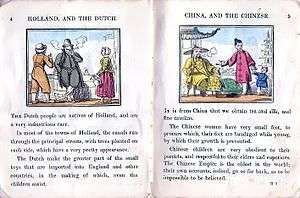Mores
Mores (/ˈmɔːreɪz/ sometimes /ˈmɔːriːz/;[1] from Latin mōrēs, [ˈmoːreːs], plural form of singular mōs, meaning 'manner, custom, usage, or habit') are social norms that are widely observed within a particular society or culture.[2] Mores determine what is considered morally acceptable or unacceptable within any given culture.

William Graham Sumner (1840–1910), an early U.S. sociologist, introduced both the terms "mores" (1898)[3] and "folkways" (1906) into modern sociology.[4][5]
| Look up mores in Wiktionary, the free dictionary. |
Terminology
The English word morality comes from the same Latin root "mōrēs", as does the English noun moral. However, mores do not, as is commonly supposed, necessarily carry connotations of morality. Rather, morality can be seen as a subset of mores, held to be of central importance in view of their content, and often formalized in some kind of moral code.
The Greek terms equivalent to Latin mores are ethos (ἔθος, ἦθος, 'character') or nomos (νόμος, 'law'). As with the relation of mores to morality, ethos is the basis of the term ethics, nomos give the suffix -onomy, as in astronomy.
Anthropology
The meaning of all these terms extend to all customs of proper behavior in a given society, both religious and profane, from more trivial conventional aspects of custom, etiquette or politeness—"folkways" enforced by gentle social pressure, but going beyond mere "folkways" or conventions in including moral codes and notions of justice—down to strict taboos, behavior that is unthinkable within the society in question, very commonly including incest and murder, but also the commitment of outrages specific to the individual society such as blasphemy. Such religious or sacral customs may vary.
While cultural universals are by definition part of the mores of every society (hence also called "empty universals"), the customary norms specific to a given society are a defining aspect of the cultural identity of an ethnicity or a nation. Coping with the differences between two sets of cultural conventions is a question of intercultural competence.
Differences in the mores of various nations are at the root of ethnic stereotype, or in the case of reflection upon one's own mores, autostereotypes.
See also
- Culture-bound syndrome
- Enculturation
- Euthyphro dilemma, discussing the conflict of sacral and secular mores
- Habitus (sociology)
- Nihonjinron "Japanese mores"
- Piety
- Political and Moral Sociology: see Luc Boltanski and French Pragmatism
- Repugnancy costs
- Value (personal and cultural)
References
- "mores". The American Heritage Dictionary of the English Language (5th ed.). Boston: Houghton Mifflin Harcourt.
- Macionis, John J.; Gerber, Linda Marie (2010). Sociology (7 ed.). Pearson Education Canada. p. 65. ISBN 9780138002701.
- "mores". Oxford English Dictionary (3rd ed.). Oxford University Press. September 2005. (Subscription or UK public library membership required.) - "Professor Sumner:-..Systematic Societology..knowledge and pseudo-knowledge, world philosophy, otherworldliness, industrial theories, mores, codes, mental training, traditional wisdom."
- Macionis, John J.; Gerber, Linda Marie (2010). Sociology (7 ed.). Pearson Education Canada. p. 65. ISBN 9780138002701.
- Sumner, William Graham (1906). Keller, Albert Galloway (ed.). Folkways: A Study of the Sociological Importance of Usages, Manners, Customs, Mores, and Morals. Ginn. pp. 692.
| Look up folkway or mores in Wiktionary, the free dictionary. |